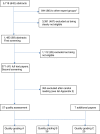Health effects of protein intake in healthy adults: a systematic literature review
- PMID: 23908602
- PMCID: PMC3730112
- DOI: 10.3402/fnr.v57i0.21245
Health effects of protein intake in healthy adults: a systematic literature review
Abstract
The purpose of this systematic review is to assess the evidence behind the dietary requirement of protein and to assess the health effects of varying protein intake in healthy adults. The literature search covered the years 2000-2011. Prospective cohort, case-control, and intervention studies were included. Out of a total of 5,718 abstracts, 412 full papers were identified as potentially relevant, and after careful scrutiny, 64 papers were quality graded as A (highest), B, or C. The grade of evidence was classified as convincing, probable, suggestive or inconclusive. The evidence is assessed as: probable for an estimated average requirement of 0.66 g good-quality protein/kg body weight (BW)/day based on nitrogen balance studies, suggestive for a relationship between increased all-cause mortality risk and long-term low-carbohydrate-high-protein (LCHP) diets; but inconclusive for a relationship between all-cause mortality risk and protein intake per se; suggestive for an inverse relationship between cardiovascular mortality and vegetable protein intake; inconclusive for relationships between cancer mortality and cancer diseases, respectively, and protein intake; inconclusive for a relationship between cardiovascular diseases and total protein intake; suggestive for an inverse relationship between blood pressure (BP) and vegetable protein; probable to convincing for an inverse relationship between soya protein intake and LDL cholesterol; inconclusive for a relationship between protein intake and bone health, energy intake, BW control, body composition, renal function, and risk of kidney stones, respectively; suggestive for a relationship between increased risk of type 2 diabetes (T2D) and long-term LCHP-high-fat diets; inconclusive for impact of physical training on protein requirement; and suggestive for effect of physical training on whole-body protein retention. In conclusion, the evidence is assessed as probable regarding the estimated requirement based on nitrogen balance studies, and suggestive to inconclusive for protein intake and mortality and morbidity. Vegetable protein intake was associated with decreased risk in many studies. Potentially adverse effects of a protein intake exceeding 20-23 E% remain to be investigated.
Keywords: Nordic nutrition recommendations; animal protein; chronic disease; mortality; nitrogen balance; protein requirement; vegetable protein.
Figures
References
-
- Nordic Nutrition Recommendations 2004. 4th ed. Copenhagen: Nordic Council of Ministeres; 2004. Integrating nutrition and physical activity.
-
- Institute of Medicine. Dietary reference intakes for energy, carbohydrates, fiber, fat, protein and amino acids (Macronutrients); Washington DC: Food Nutrition Board; 2002.
-
- Rand WR, Pellett PL, Young VR. Meta-analysis of nitrogen balance studies for estimating protein requirements in healthy adults. Am J Clin Nutr. 2003;77:109–27. - PubMed
-
- WHO/FAO/UNU. Protein and amino acids requirements in human nutrition: report of a joint WHO/FAO/UNU expert consultation; Geneva, Switzerland: World Health Organization; 2007. WHO Technical Series, No. 935.
-
- European Food safety Authority (EFSA) EFSA panel on dietetic products, nutrition and allergies (NDA); scientific opinion on dietary rerence values for protein. EFSA J. 2012;10:2557.
LinkOut - more resources
Full Text Sources
Other Literature Sources


